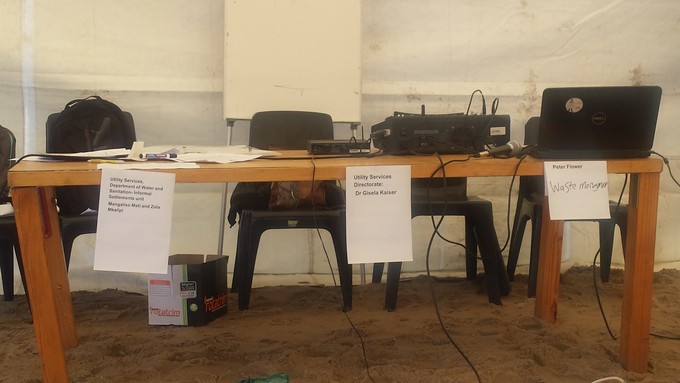City snubs Khayelitsha meeting on toilets
“The truck meant to fetch the portaloos never comes”
Child minder Nonkoliso Tshemese, of Ndlovini, Monwabisi Park, only has six portaloos for her 65 children to use.
Tshemese, 58, runs an informal crèche, and said her pleas since 2014 for more portaloos from City of Cape Town officials have fallen on deaf ears.
“They kept telling me they’d try. I’m still waiting. There are many other residents with heartbreaking stories who are also waiting. Some of them have to relieve themselves in a plastic bag,” said Tshemese.
“The truck meant to fetch the portaloos never comes, so I clean them myself,” she added.
She was speaking at a Social Justice Coalition (SJC) public hearing on the social audit of the provision of sanitation in Monwabisi Park.
The social audit was conducted by Monwabisi Park residents in partnership with the SJC and the South African National Civic Organisation (Sanco).
The audit – which includes interviewing residents and physical verification of sanitation services – was conducted between 14 and 23 July 2016.
870 Monwabisi Park residents were interviewed.
While most (42%) of the residents said they had access to a communal pour flush toilet (this is a toilet in which water is poured into it to flush the contents), a quarter of the interviewees said they went to the bush to relieve themselves. The majority of these residents said it took them between four and ten minutes to access a pour flush toilet. Portaloos were reported as the third most common way for the residents to relieve themselves.
Giving feedback on the social audit, community members said some Monwabisi Park residents – like 46-year-old Veliswa Rongo – had resorted to digging pit toilets for themselves.
“I dug a deep hole right at the back of my house and surrounded it with tyres. When a hole is full I have to dig out another hole. I’m already running out of space. But I can’t access the communal flush toilet because some residents lock them and keep the keys to themselves.”
Rongo said: “The pit toilets stink. In summer there are maggots and mosquitoes all around them.”
Other residents told stories of having to carry sick relatives to a bucket, and being assaulted and robbed at gunpoint while going to relieve themselves in the bush.
Ironically, the public hearing was held on a field near the City’s Violence Protection through Urban Upgrading (VPUU) office, which has a flush toilet inside.
SJC activist, Luthando Tokota, said seven City officials were invited to the public hearing. But none attended. Tokota said only one official notified the organisation he would not attend, saying he was busy with campaigning for the elections on 3 August.
The seven City officials had not responded to emails from GroundUp enquiring about their absence by the time of publishing.
SJC General Secretary, Phumeza Mlungwana, said the City should not think it had dodged a bullet by not attending the public hearing.
“We have testimonies and evidence of how people are living. We’ll put those together, make a report, and send it to them. Should they ignore us, we will fight them. Our rights must not be violated because we are black and poor. It can’t be that, in 2016, black people in South Africa have to go to the bush to relieve themselves.
“VPUU offices have toilets, which means that it’s possible to have a flush toilet in Monwabisi Park. Why aren’t there flush toilets elsewhere here?” asked Mlungwana.
Support independent journalism
Donate using Payfast

Don't miss out on the latest news
We respect your privacy, and promise we won't spam you.
Next: Flemming Rose and academic freedom: a response to Nathan Geffen
Previous: Elections, the SABC and the unions
© 2016 GroundUp. 
This article is licensed under a Creative Commons Attribution-NoDerivatives 4.0 International License.
You may republish this article, so long as you credit the authors and GroundUp, and do not change the text. Please include a link back to the original article.

